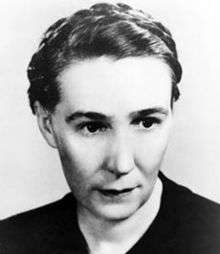Caroline Gordon
Caroline Ferguson Gordon (October 6, 1895 – April 11, 1981) was a notable American novelist and literary critic who, while still in her thirties, was the recipient of two prestigious literary awards, a 1932 Guggenheim Fellowship and a 1934 O. Henry Award.

Biography
Born and raised in Todd County, Kentucky at her family's plantation home known as "Woodstock," Caroline Gordon received a high level of education at her father's Clarksville Classical School for Boys in neighboring Montgomery County, Tennessee. By 1916 she had graduated from West Virginia's Bethany College and obtained a job as a writer of society news for the Chattanooga Reporter newspaper.[1] After eight years, she left Chattanooga and returned home, where, at the age of twenty-nine, she met Allen Tate, a free-spirited "bohemian" poet, commentator and essayist, four years her junior. They immediately embarked on a passionate love affair which culminated in a pregnancy and a May 15, 1925 wedding. Their daughter Nancy was born in September.
Over the next twenty years, Caroline Gordon (who retained her maiden name) and Allen Tate lived in a house in Clarksville, Tennessee that they bought with the generous assistance of Tate's brother Ben. It was the first of their houses named for Ben Tate: "BenFolly", and later, in Princeton they owned a house on Nassau Street called BenBrackets. Their guests at BenFolly included some of the best-known writers of their time, including Robert Lowell, who famously camped on their lawn in a tent one summer, absorbing everything he could from his mentor, Allen Tate, while enjoying the southern cooking and constant social life provided by Caroline Gordon. Other visitors were F. Scott Fitzgerald, Ernest Hemingway, William Faulkner, Flannery O'Connor, T. S. Eliot, Robert Penn Warren, and Ford Madox Ford, the author whom Gordon considered her mentor. Ford counseled and prodded her into completing her first novel Penhally, published in 1931.[1] Gordon received both of her awards, the Guggenheim and the O. Henry, during this early period. The O. Henry was a unique second-place prize awarded for her 1934 short story "Old Red", published in Scribner's Magazine. There were seventeen third-place recipients that year, including William Saroyan, Pearl Buck, Erskine Caldwell, William Faulkner, John Steinbeck, and Thomas Wolfe.[2]
Between 1934 and 1972, Gordon published nine additional novels, five of which were written during the late 1930s and World War II.
Gordon's early fiction was influenced by her association with the Southern Agrarians.[3] Paul V. Murphy writes that she "exhibited a southern nostalgia as strong as any member of the group, including Davidson, the most unreconstructed of the Agrarians".[4]
Caroline Gordon's marriage to Allen Tate ended in divorce in 1945, followed by a 1946 remarriage and an ultimate divorce in 1959. They continued to correspond, however, and remained friends. On November 24, 1947, during another difficult period in her marriage, Gordon converted to Catholicism. She became a friend and mentor to the Southern novelist Walker Percy, another convert to Catholicism, aiding him in his literary efforts. Caroline Gordon was also a close friend of the Georgia author, Brainard Cheney, and his wife, Frances (Fanny) Neel Cheney. Cheney, author of four novels based in south Georgia, considered Caroline to be his "literary mentor." She taught him to write literature as compared to journalism, his previous occupation being that of a crime reporter. Influenced by Gordon and her husband, Allen Tate, they converted to Catholicism. She also introduced them to Flannery O'Connor, with whom they became close friends.
She continued to write until crippled by a March 1, 1981, stroke in San Cristóbal de las Casas, Chiapas, Mexico, where she lived in her later years. She died six weeks later, following surgery, at the age of 85.
Selected works
- Penhally (1931)
- Aleck Maury, Sportsman (1934)
- None Shall Look Back (1937)
- The Garden of Adonis (1937)
- Green Centuries (1941)
- The Women on the Porch (1944)
- The Forest of the South (1945)
- The House of Fiction: An Anthology of the Short Story (with Allen Tate) (1950)
- The Strange Children (1951)
- The Malefactors (1956)
- A Good Soldier: A Key to the Novels of Ford Madox Ford (1957)
- How to Read a Novel (1957)
- Old Red and Other Stories (1963)
- The Glory of Hera (1972)
- The Collected Stories of Caroline Gordon (1981)
References
- Powell, Mona. "Caroline Gordon" Archived February 5, 2007, at the Wayback Machine, KYLIT — a site devoted to Kentucky writers.
- O. Henry Award Winners 1919-2000
- Caroline Gordon: Introduction, eNotes.
- Murphy, Paul V. (2001). The Rebuke of History: Introduction Archived 2012-01-19 at the Wayback Machine, University of North Carolina Press, p. 9.